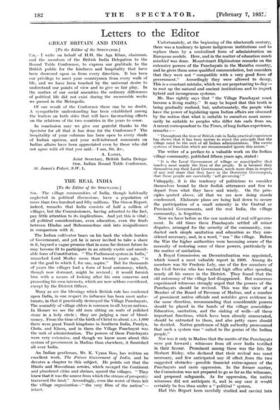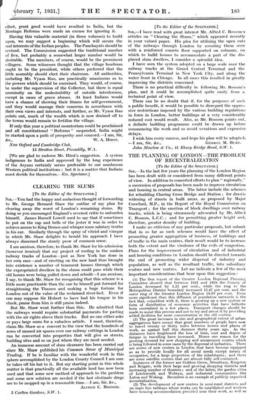THE REAL INDIA [To the Editor of the SPECTATOR.]
Sui,—The village communities of India, though habitually neglected in political discussions, have a population. of more than two hundred and fifty millions. The Simon Report, indeed, remarks that India consists of half a million of villages, but the Commissioners, having adverted to the fact, pay little attention to its implications. And yet this is vital ; all political considerations, even education, even the feuds between Hindus and Mahommedans sink into insignificance in comparison with it.
The Indian cultivator bears on his back the whole burden of Government, and yet he is never invited to take a share in it, beyond a vague promise that in some far distant future he may become fit to participate in an utterly exotic and unsuit- able form of Constitution. " The Parliament system in India," remarked Lord Morley more than twenty years ago, " is not the goal to which I, for one, aspire." But for thousands of years the villager had a form of local autonomy, which, though now dormant, might be revived ; it would furnish him with a means of looking after his own concerns and promoting his own interests, which are now seldom considered, except by the District Officer.
Many as are the blessings which British rule has conferred upon India, in one respect its influence has been most unfor- tunate, in that it practically destroyed the Village Panchayats. The assembly of village elders is common to all Aryan nations. In Homer we see the old men sitting on, seats of polished stone in a holy circle ; they are judging a case of blood- money. From the time of the birth of Christ to about A.D. 1,000 there were great Tamil kingdoms in Southern India, Pandya, Chola, and Khera, and in them the Village Panchayat was the unit of administration. The powers of these Panehayats were very extensive, and though we know more about this system of government in Madras than elsewhere, it flourished all over India.
An Indian gentleman, Mr. K. Vyasa Rao, has written an excellent work, The Future Government of India, and he devotes a chapter to this subject. He points out that the Hindu and Mussuhnan armies, which ravaged the Continent and plundered cities and shrines, spared the villages. " They knew that it was the source from which the stream of prosperity traversed the land." Accordingly, even the worst of them left the village organization—" the very fibre of the nation"— intact.
Unfortunately, at the beginning of the nineteenth century, there was a tendency to ignore indigenous institutions and to replace them by a centralized form of administration on European models. Here, and in the matter of education much mischief was done. Mountstuart Elphinstone remarks on the extensive powers of the Panchayats in the Maratha country,
and he gives them some qualified commendation, but considers that they were not " compatible with a very good form of
government." Accordingly they were allowed to decay. This is a constant mistake, which we are perpetuating to-day-- to root up the natural and ancient institutions and to import hybrid and incongruous systems.
Mr. Rao rightly says that " the Village Panchayat must
become a living reality." It may be hoped that this truth is being gradually realised, but, unfortunately, the people who have the power of legislating upon Indian affairs are obsessed by the notion that what is suitable to ourselves must neces- sarily be suitable to peoples who differ fete caelo from us. A recent correspondent to the Times, of long Indian experience, remarks :— " Throughout the time of British rule in India practical experience has shown that it has been unwise to reject the principle that the village must be the unit of all Indian administration. The exotic systems of franchise which are recommended ignore this axiom."
The writer of a preface to a valuable work on the Indian village community, published fifteen years ago, stated : " It is the Local Government of village or municipality that touches most nearly the lives of the people. It is because they themselves run their Local Government, much more than in respect of any real share that they have in the Dominion Government, that these people are essentially ' self-governing.' "
Unhappily, it is the tendency of politicians to consider themselves bound by their foolish utterances and free to depart from what they have said wisely. On the prin- ciples quoted above, all that we are now doing stands condemned. Elaborate plans are being laid down to secure the participation of a small minority in the Central or Provincial Governments, and the real India; the village community, is forgotten.
Now we have before us the raw material of real'self-govern- ment. In old times these Panchayats settled all minor
disputes, arranged for the security of the community, con- ducted such simple sanitation and education as they con- sidered necessary, and, in a word, " ran " the village. Before
the War the higher authorities were becoming aware of the necessity of restoring some of these powers, particularly in the matter of sanitation.
A Royal Commission on Decentralization was appointed, which issued a most valuable report in 1909. Among its members was Sir Frederic Lely, one of the few members of the Civil Service who has reached high office after spending nearly all his career in the District. They found that the old autonomy of the village had disappeared. But numerous experienced witnesses strongly urged that the powers of the Panchayats should be revived. This was the view of a Member of the Board of Revenue of Madras, and a number of prominent native officials and notables gave evidence in the same direction, recommending that considerable powers
should be placed in the hands of the village assemblies. Education, sanitation, and the sinking of wells—all these important functions, which have been already enumerated, should be entrusted to them, and also petty cases should be decided. Native gentlemen of high authority pronounced that such a system was " suited to the genius of the Indian people."
Nor was it only in Madras that the merits of the Panchayats were put forward ; witnesses from all over India testified in their favour. Prominent among these was the late Sir Herbert Risley, who declared that their revival was most necessary, and few anticipated any ill effect from the two suggested obstacles—possible financial extravagance of the Panchayats and caste oppression. In the former matter, the Commission was not prepared to go as far as the witnesses,
and proposed safeguards. As for oppression, the native witnesses did not anticipate it, and in any case it would certainly be less than under a " political " system.
Had this Report been carefully studied and carried into
effect, great good would have resulted to India, but the Montagu Reforms were made an excuse for ignoring it.
Having this valuable material (in three volumes) to build upon, we may suggest a beginning which will secure the real interests of the Indian peoples. The Panchayats should be revived. The Commission suggested the traditional number of five, but probably a somewhat larger number would be desirable. The members, of course, would be the prominent villagers. Some witnesses thought that the village headman ought to be the president, while others preferred that the little assembly should elect their chairman. All authorities, including Mr. Vyasa Rao, are practically unanimous as to the powers which should be exercised. They would, of course, be under the supervision of the Collector, but there is equal unanimity on the undesirability of outside interference, except in cases of grave abuses. At least Indians would have a chance of showing their fitness for self-government, and they would manage their concerns in accordance with their own views and interests, and further, as Mr. Vyasa Rao points out, much of the wealth which is now drained off to the towns would remain to fertilize the village.
If only this year a political moratorium could be proclaimed and all constitutional " Reforms " suspended, India might be started upon a path of prosperity and concord.—I am, Sir, 15 Stratton Street, Piccadilly, W.1.
[We are glad to endorse Mr. Hirst's suggestion. A system indigenous to India and approved by the long experience of the Aryans certainly seems preferable to our mushroom Western political institutions ; but it is a matter that Indians must decide for themselves.—En. Spectator.]











































 Previous page
Previous page